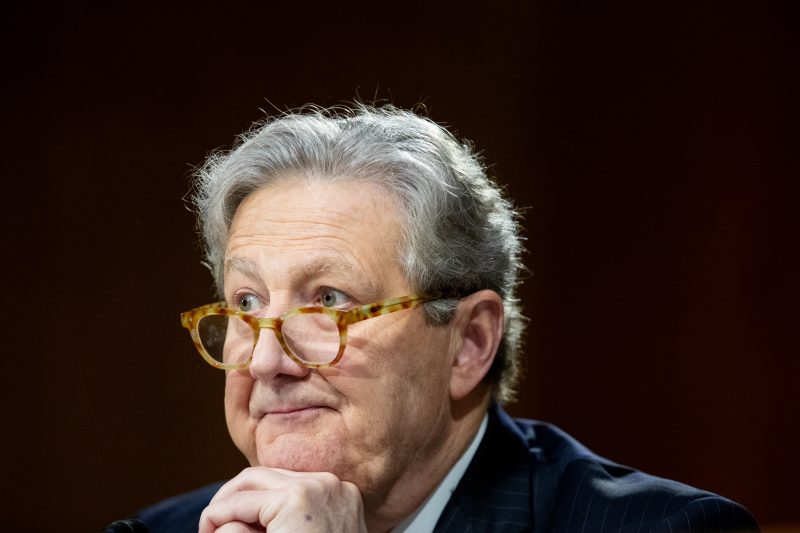Senate Republicans clashed Wednesday with a federal judge who voiced concerns about the transparency of a 2011 ethics review of Supreme Court Justice Clarence Thomas during a judiciary subcommittee hearing.
Sen. John Kennedy (La.), the subcommittee’s top Republican, slammed the hearing as being part of a “perpetual political carousel” that makes him “want to gag” and questioned Judge Mark L. Wolf’s credibility as a witness.
“For the last dozen years, a lone federal judge, who is with us today, has been obsessed with complaining that the judicial conference got it wrong,” Kennedy said in his opening remarks. “Judge Wolf wasn’t getting his way from the head of the judicial conference or from Chief Justice Roberts himself.”
Several Democrats, including Sen. Richard J. Durbin (D-Ill.), chairman of the Senate Judiciary Committee who sat in for Wednesday’s hearing, came to Wolf’s defense, arguing that the hearing is not a “witch hunt” but an attempt to “rescue the reputation of the court.”
Sen. Sheldon Whitehouse (D-R.I.), chairman of the subcommittee that oversees the federal courts, convened the hearing after new reporting revealed that Wolf had expressed concerns more than a decade ago about how a committee of federal judges was handling a review of complaints alleging that Thomas had flouted financial disclosure rules. The financial disclosure committee ultimately concluded that Thomas had not willfully committed any wrongdoing.
Wolf took issue with the transparency of the review. “The manner in which the Judicial Conference has interpreted and implemented the Financial Disclosure statutes has been shrouded in secrecy,” Wolf wrote in his opening statement.
Wednesday’s hearing is Whitehouse’s latest attempt to examine the inner workings of the federal courts’s policymaking body following new revelations about the high court’s longest-serving justice. “Congress has a role in making sure that our courts are administering federal ethics fairly and as intended. If they aren’t, we need a robust record of what has gone wrong and what new laws might be needed to fix it,” Whitehouse said in his opening remarks.
When a justice or judge is accused of falsifying or omitting information from their financial disclosure report, the Judicial Conference’s Committee on Financial Disclosure launches a probe that could culminate in a referral to the attorney general.
Bloomberg News revealed this month that Wolf believed the judicial conference, of which he was a member at the time, couldn’t exercise this authority because the financial disclosure committee hadn’t informed the conference what those complaints were.
Thomas was under fire in 2011 for not disclosing his wife’s employers and travel paid for by Dallas billionaire Harlan Crow.
The revelations drew condemnations from Democrats and court transparency advocates, who pressed the judicial conference to investigate Thomas. The late Rep. Louise M. Slaughter (N.Y.) and 19 other Democrats signed a September 2011 letter asking the judicial conference to refer the matter to the Justice Department.
The conference referred the complaints to the 16-member financial disclosure committee, which was chaired by Judge Bobby R. Baldock at the time and then by Judge Joseph McKinley, the chief judge of the western district of Kentucky, who succeeded him later that year. The committee is responsible for ensuring compliance with the Ethics in Government Act.
Wolf, who said he hadn’t seen the 2011 letters, criticized the committee’s failure to share information about the allegations with the conference.
“This concerned me because the issues raised by the letters were serious,” Wolf wrote. “Such information would have afforded me and the other members of the Conference the opportunity to discuss and decide whether there was reasonable cause to believe Justice Thomas had willfully violated the Act and, if so, to make the required referral to the Attorney General.”
The financial disclosure committee cleared Thomas and, instead, opted to amend its internal process for reviewing ethics complaints.
Now after a justice or judge is accused of violating financial disclosure rules and a member of the committee has reviewed the accusations made against them, a referral is made to the subcommittee on compliance. The subcommittee reviews the allegations and the reviewing judge’s findings, and issues a recommendation to the full committee about whether to accept that judge’s assessment. The financial disclosure committee must also now report the number and nature of the complaints — as well as the action taken — to the full conference.
The committee will follow these steps when reviewing complaints about Thomas.
Whitehouse and Rep. Hank Johnson (D-Ga.) asked the judicial conference to refer Thomas to Attorney General Merrick Garland for an investigation after ProPublica revealed last month that Crow took Thomas on lavish vacations and purchased three properties in Savannah, Ga., from him and his relatives for about $133,000, including the house where the justice’s mother lives.
Thomas did not disclose the transaction on his annual financial report, which requires disclosure of any sale or purchase of property over $1,000. He also did not report the trips with Crow.
Since then, new reporting has revealed that Conservative judicial activist Leonard Leo paid Virginia “Ginni” Thomas, wife of Clarence Thomas, tens of thousands of dollars in consulting work through a nonprofit. Additional ProPublica reporting has revealed that Crow also paid the tuition of the justice’s grandnephew for two private boarding schools.
If the body has “reasonable cause” to believe Thomas willfully ignored ethics rules, it will vote to refer the matter to Garland. Ten votes are needed for a referral.
